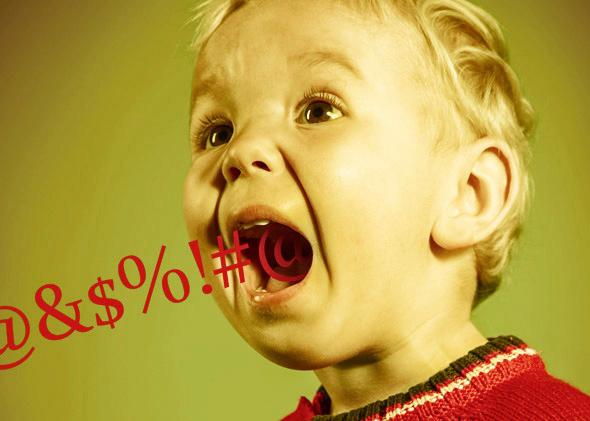I vaguely remember my son’s first crawl, his first steps, and the first time he said “mama.” But I really remember the first time he swore.
It was shortly after he had turned 3. He was playing with his toys in the other room, and I’m guessing he was getting frustrated because, for the zillionth time, his zoo animals weren’t fitting in his zoo truck. Suddenly I heard: “Fuck it chuck it!”
I froze.
My first thought was: Did I just hear what I think I heard? Then I wondered: Is it bad if I laugh? Because that was kind of hilarious. Finally I got around to musing: Shit, what do I do now? I surmised that he didn’t really know what he was saying—that he knew from the (of course very few!) times he had heard the F-bomb uttered by me that it was an emotive word and that he was feeling emotional and had decided to try it out. But I guessed that he didn’t know it was a bad word and that he certainly didn’t know its literal meaning. (I don’t know where the “chuck it” came from, but doesn’t it perfectly capture how you feel when you’re frustrated with an object? Fuck it chuck it indeed!)
I contemplated marching into the room and confronting him—Sweetie, do you want another cheese stick, and also, why did you just say, “Fuck it chuck it?” But in addition to fearing that I wouldn’t be able to keep a straight face, I wondered whether drawing attention to the phrase might be a bad idea. I also contemplated flat-out telling him that fuck was not a good word and that he shouldn’t use it. But in the end, I did nothing, and over the course of the next few months, his use of the phrase fizzled. I was happy, of course. And also a little bit sad.
When it comes to kids and swearing, there are a few things you should know. First, it’s inevitable. “Don’t think you can prevent swearing—you’re doomed to failure if you think that’s going to happen,” says Timothy Jay, a psychologist at the Massachusetts College of Liberal Arts, who has been researching profanity in kids for decades. “We’ve recorded fuck and shit in every age range that we’ve studied.” If kids don’t hear swear words from you, Jay says, they’ll hear them at school, on TV, or at the rec center—and then, yes, they’ll try them out at home. Research suggests that by the time kids enter school, they know 30 to 40 offensive words.
When you do hear your kids curse, by far the best way to respond is calmly—if you respond at all. With young kids, “the less attention paid, the better,” explains Tovah Klein, director of the Barnard College Center for Toddler Development. “When children get a big rise out of the adults, that can solidify the use of the word because the attention was big—Wow, that really bothers daddy!” So if you don’t react, the words tend to disappear faster, she says.
Still, sometimes the bad words linger even when you ignore them. Then what? “The worst thing is to yell or scream,” Jay says—and please don’t wash your kids’ mouths out with soap, he adds. If your kid is over the age of 8, you might try explaining that curse words can be offensive. “Say, ‘Well, we don’t use that word. That might hurt Grandma’s feelings,’ ” Jay says. “Try to get them to think about how that word sounds to somebody else.”
If your kid is younger than 8, though, this approach probably won’t work, because little kids have trouble putting themselves in other people’s shoes. Instead, you might start by trying to understand why your kid used the word in the first place. “Say, ‘Hey, that’s an interesting word—where did you hear that? Do you know what it means?’ ” Jay suggests. Then, proceed in one of two ways. You can tell him it’s not a word he should use at home. But that approach can backfire, because what you’ve just done is given your kid a weapon that he can fire at you when he’s upset or wants your attention. A potentially better approach, Klein says, is to allow your child to use the swear word within limits. “Tell her, ‘Some people don’t like that word, but in your room you can say it anytime,’ ” Klein says.
This gentler, more empowering approach also circumvents what might be called “the shame problem.” As Klein writes in her book How Toddlers Thrive, parents often unintentionally shame their young children when they criticize them and try to control their behavior. “If the message to the child is that these are bad words, never to be used, then the child can feel that she is a bad person for having tried them out,” Klein explains. Plus, chances are, your kid doesn’t know what these bad words actually mean and why they are bad; she just knows that you have anointed them as bad. Some research suggests that children who’ve been made to feel ashamed are more likely to withdraw and hide than own up to future mistakes. (This doesn’t mean you shouldn’t discipline your kids or set limits; just be careful not to chastise them in a way that could make them feel humiliated.)
One last thought: If your kid has developed a nasty potty mouth, you might be wise to try to identify the source of the bad language and limit it. Has he been sneak-watching The Wire? Binge-reading Hunter S. Thompson? Perhaps it’s more likely that he’s been overhearing you as you talk about your mother-in-law. Kids have an amazing knack for not listening when you want them to, but the reverse is true, too: They are often keenly paying attention when you think they aren’t. And ultimately, “a parent who swears a lot,” Klein says, “will have a hard time getting her child not to.” Well, crap.
